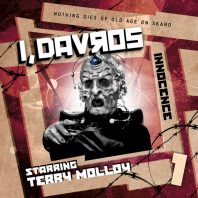
Released September 2006
The Doctor in his many travels has come upon a near-countless array of villainous figures with schemes of all sizes and forms. Yet while many have become iconic due to their visual nature or the pure physical threat that they pose, few outside of the Time Lord race have managed to become unique individuals with a shrewdness and suaveness worthy of repeat narrative investment. From his introduction in ‘Genesis of the Daleks,’ Davros has proven to be one such character, albeit one who should still be used in moderation to allow his Daleks to roam the universe unfettered, and Big Finish now attempts to humanise this figure by giving the origin story of the megalomaniacal scientist who would come to find himself so entwined with the fate of the universe through the forced ideals of his most notorious creations with I, Davros.
There are several avenues that glimpses into formative points in a villain’s past can explore, and ‘Innocence’ by Gary Hopkins makes the interesting choice of not going down the most common path of showing Davros as a wholly virtuous individual who then suffers some trauma that changes his overall motivations and personality. Instead, though he is always one fascinated with life in all forms and the process of evolution, his instinctual nature to take science and experimentation into morally grey areas is always present, and the circumstances in which he finds himself on a planet that has been ravaged for countless generations by the unending war between the Kaleds and the Thals who can longer remember exactly what they are actually fighting for give him opportunities he would have otherwise have had. This is a young man already detached from the world around him, and his lack of remorse when finding out that his father has died as he throws himself into his studies and suggests that those close to death would make perfect subjects for his tutor’s radiation and mutation experiments prove that others around him were right to fear him. This quick descent into madness when seizing the opportunity to take his fascination to its extreme when presented with lessons with the esteemed Tutor Magrantine is chillingly dark and effective, and Rory Jennings does an incredible job in showing a morbid curiosity for the potential with an utter disdain for the present.
Hopkins also does great work building up the political and familial components of this drama, and it’s frighteningly easy to see just how Davros has arrived at this point. Carolyn Jones as Lady Calcula and Richard Franklin as Colonel Nasgard give powerful performances as his parents, and the resulting conflicting mixture of passion for science and military fortitude forms the intellectual backbone for this burgeoning talent who sees no specific boundaries, physically or ethically. At the same time, Calcula’s disdain for her more military-inclined daughter Yarvell is palpable as she claims the extra classes she has set up for Davros would be wasted on Yarvell, and the strained relationship between the three both before and after Nasgard’s suspicious death should prove an interesting dynamic to continue to explore as the war continues alongside Davros’s own machinations. As the poisons creep closer to the city and only the elite are afforded clear views and healthy lives, it seems initially apparent that Calcula is in some way responsible for her husband’s demise after he was refused an honourable execution and returned to his family infirmed, but the fact that she is so heartless despite her innocence and instead uses the death to further her political aims is all the more alarming and reaffirms just how dangerous this Skaro is with complex relationships based on revenge, hatred, and lies- even of Davros’s true father- forging the paths of actions.
‘Innocence’ perhaps shows Davros’s ultimate misguided madness a bit too quickly as he already turns his ambition against his mentor, but the fascinating tone, atmosphere, and relationships on display are a strong early indicator of success for this brief but weighty look into the man behind the Daleks.
- Release Date: 9/2006


Leave a Reply